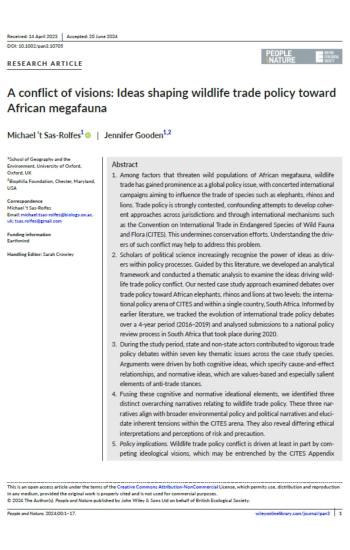

A conflict of visions: Ideas shaping wildlife trade policy toward African megafauna
The issue of wildlife trade is a major concern for the conservation of African megafauna, such as elephants, rhinos, and lions. International efforts to regulate this trade have faced significant challenges, leading to conflicts over wildlife trade policies across different countries and within the global framework of the Convention on International Trade in Endangered Species (CITES). This conflict hampers conservation efforts aimed at protecting these species. To better understand why this conflict arises, we can turn to political science theories, which highlight the role of ideas in shaping policy positions and decisions.
For our study, we developed a framework to analyse the ideas driving the conflict over wildlife trade policies. We focused on debates surrounding the trade of African elephants, rhinos, and lions at both the international level within CITES and within a single country, South Africa. Over a five-year period, we examined how different stakeholders contributed to these debates and identified key themes that emerged.
Our analysis revealed that both cognitive ideas, which explain cause-and-effect relationships, and normative ideas, which are based on values, drove debates over wildlife trade policies. These ideas shaped arguments for and against trade, highlighting differing ethical perspectives and perceptions of risk. By combining these cognitive and normative elements and drawing on further statements about assumed rights and responsibilities, we identified three main narratives that underpin wildlife trade policy discussions. These narratives not only shed light on tensions within the CITES framework but also reflect broader environmental and political narratives. Importantly, they emphasize how differing ideological visions contribute to the conflict over wildlife trade policies.
Our findings suggest that the structure of the CITES framework may exacerbate this conflict by reinforcing opposing ideological viewpoints. This highlights the need for further research to understand the structural dynamics at play and their implications for conservation efforts.
’t Sas-Rolfes,
-

Dr Michael 't Sas-Rolfes
Research Associate -
Jennifer Gooden
We support the free flow of information. Please share:
More content
-

What Foot and Mouth Disease-free means for South Africa’s game meat trade
Ms Lydia Daring Bhebe…Explore the latest developments in South African provinces achieving and maintaining Foot and Mouth Disease (FMD) free status…
Articles -

The world wildlife trade regulator is 50 – here’s what has worked and what needs to change
Daniel Challender…Most countries implement Cites, the Convention on International Trade in Endangered Species of Wild Fauna and Flora as…Articles -

Enabling Sustainable Wildlife Trade
Prof Francis VorhiesEnabling sustainable wildlife trade is a key policy measure for growing Africa's wildlife economy. In this respect, CITES…
Articles -

Has CITES become too complicated to be effective?
Prof Francis VorhiesGovernments agreed to the text of CITES in the 1970s, which is quite straightforward. However, the agreement’s implementation…
Articles -

From poachers to providers: Can Africa's wild meat market save wildlife?
Dr Wiseman NdlovuHave you ever considered how wild meat could be more than just a cultural staple but also a…
Articles -

As a fellow of the African Wildlife Economy Institute (AWEI), I am excited to attend the upcoming 3rd…
Articles -

A theory of change to improve conservation outcomes through CITES
Dr Michael 't Sas-Rolfes…Here we articulate the implied theory of change (ToC) underpinning the design and operation of CITES (Convention on...
2025Research -

Wild Meat Value Chain Integration Systems: Opportunities for Value Chain Formalisation and Scaling in Africa
Dr Wiseman Ndlovu…Establishing a legal, safe and sustainable wild meat sector promises to potentially reduce demand for illegally sourced meat...
2025Research -

AWEI's 2024 Wildlife Economy Dialogue Series
Ms Emily TaylorRediscover 2024: A year of insight and inspiration
In 2024, AWEI proudly hosted three ground-breaking dialogue series in…
Articles
Get updates by email
Through impactful research, stakeholder engagement, and professional development, AWEI is supporting the wildlife economy across Africa. Please subscribe for occasional updates on our work and forthcoming events.
Sign up for a quarterly dose of AWEI insights
In a complex and changing world, AWEI generates strategic ideas, conducts independent analysis on wildlife economies, and collaborates with global scholar-practitioners to provide training and expertise for biodiversity conservation, climate resilience, and inclusive economic opportunities in Africa.
